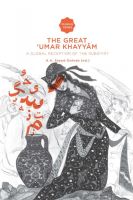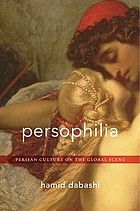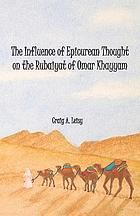The Great ‘Umar Khayyám. A Global Reception of the Rubáiyát. A.A. Seyed-Gohrab. Leiden, Leiden University Press, 2012. 267 p. (Iranian Studies Series). ISBN: 9789087281571.
INTRODUCTION
Khayyám’s Universal Appeal: Man, Wine, and the Hereafter in the Quatrains. A.A. Seyed-Gohrab
KHAYYÁM IN PERSIA
Reading the Rubá’iyyát as “Resistance Literature”. M. Aminrazavi
Some ‘Umarian Quatrains from the Lifetime of ‘Umar Khayyám. A.H. Morton
Between Tavern and Madrasa: ‘Umar Khayyám the Scientist. M. Bagheri
KHAYYÁM IN THE ARAB WORLD AND TURKEY
The Arab ‘Umar Khayyám. M. Alsulami
Ahmad Rámí’s Arabic translation of the Quatrains of ‘Umar Khayyám. Jan Just Witkam
Quatrains of ‘Umar Khayyám in Turkish and Turkish Quatrains. S. Sötemann
KHAYYÁM IN THE NETHERLANDS
Other Persian Quatrains in Holland: the Roseraie du Savoir of Husayn-i Ázád. J.T.P. de Bruijn
Khayyám’s Impact on Modern Dutch Literature. M. Goud
Bitter Certainty: J.H. Leopold on ‘Umar Khayyám. J.D.F. van Halsema
How ‘Umar Khayyám Inspired Dutch Visual Artists. J. Biegstraaten
The Legacy of ‘Umar Khayyám in Music of the Netherlands. R. de Groot
THE RUSSIAN AND GEORGIAN RECEPTION OF KHAYYÁM
The Russian perception of Khayyám: from text to image. F. Abdullaeva, N. Chalisova, Ch. Melville
The Translation of ‘Umar Khayyám’s Poetry into Georgian – a Touchstone for Translators. T. Shurgaia
KHAYYÁM’S RECEPTION IN VICTORIAN ENGLAND
The Reception of FitzGerald’s Rubáiyát of ‘Umar Khayyám by the Victorians. E. Zare-Behtash
KHAYYÁM IN INDIA
Vernacularizing Rubaiyat: the Politics of Madhushala in the context of the Indian Nationalism. A. Castaing
Attempts at Locating the Rubáiyát in Indian Philosophical Thought. A. Rangarajan
INTERNATIONAL KHAYYÁM DATA-BASE
An ‘Umar Khayyám Database. J. Coumans



